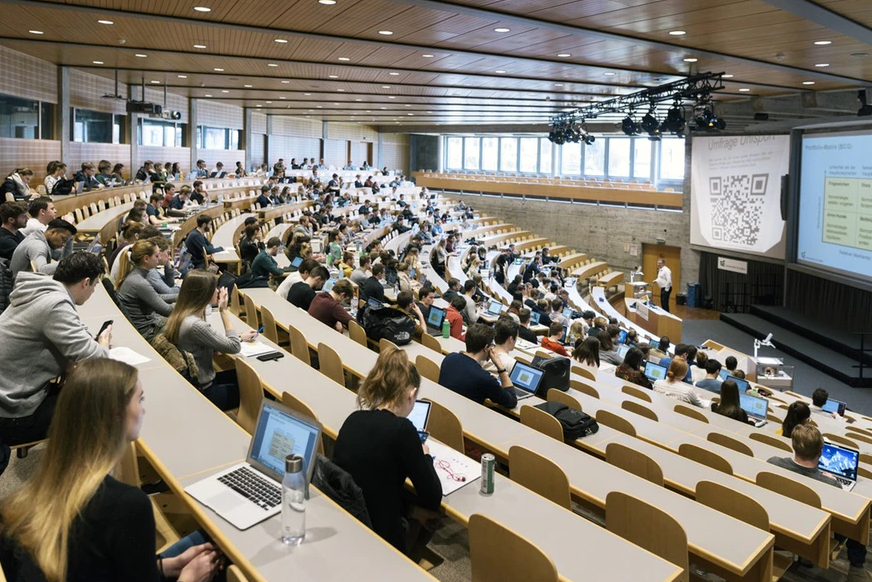Students and expanding companies are demanding more blockchain courses at Swiss universities. © Keystone / Christian Beutler The rapidly expanding Swiss blockchain industry is facing growing pains: a limited supply of qualified workers to fill the expanding number of job vacancies. Universities are stepping up to meet the challenge by designing new courses around blockchain and decentralised finance. Blockchain is the digital system that powers bitcoin and other cryptocurrencies. The code is designed to replace traditional gatekeepers, such as banks and technology providers. Decentralised finance promises blockchain trading without the friction and fees of intermediaries. The number of blockchain companies has risen from 300 in 2017 to around 1,200, employing more
Topics:
Swissinfo considers the following as important: 3.) Swissinfo Business and Economy, 6c) Crypto Currencies English, Featured, newsletter, Sci & Tech, Sci & Tech
This could be interesting, too:
Nachrichten Ticker - www.finanzen.ch writes Die Performance der Kryptowährungen in KW 9: Das hat sich bei Bitcoin, Ether & Co. getan
Nachrichten Ticker - www.finanzen.ch writes Wer verbirgt sich hinter der Ethereum-Technologie?
Martin Hartmann writes Eine Analyse nach den Lehren von Milton Friedman
Marc Chandler writes March 2025 Monthly

Students and expanding companies are demanding more blockchain courses at Swiss universities. © Keystone / Christian Beutler
The rapidly expanding Swiss blockchain industry is facing growing pains: a limited supply of qualified workers to fill the expanding number of job vacancies. Universities are stepping up to meet the challenge by designing new courses around blockchain and decentralised finance.
Blockchain is the digital system that powers bitcoin and other cryptocurrencies. The code is designed to replace traditional gatekeepers, such as banks and technology providers. Decentralised finance promises blockchain trading without the friction and fees of intermediaries.
The number of blockchain companies has risen from 300 in 2017 to around 1,200, employing more than 6,000 staff in Switzerland. New domestic start-ups are being supplemented with a growing list of foreign-based companies establishing a Swiss base, such as Fireblocks, BitMEX and FTX Europe.
The southern Swiss city of Lugano has recently announced ambitious plans to boost the local blockchain sector and create more jobs. But there’s a problem. “Blockchain companies need a skilled workforce. Currently, demand in this sector greatly exceeds the offer,” said Pietro Poretti, Lugano’s Economic Development Director.
One company that would like to set up in Lugano is Tether, known for creating the world’s most widely used stablecoin – a cryptocurrency that pegs its value to the US dollar.
Struggling to fill posts
Tether and its sister company, the Bitfinex cryptocurrency exchange, have staked out Lugano as a potential base from which to capture the wealth of financial expertise in Switzerland, says Paolo Ardoino, who is Chief Technology Officer of both enterprises.
“We are struggling to find talented developers, customer support agents, compliance officers and marketing experts,” said Ardoino. “Tether and Bitfinex have opened up plenty of new jobs recently – we are looking for tens, up to hundreds of people.”
Lugano and Tether are attempting to tackle this mismatch by coordinating with the city’s three higher educational establishments and aim to provide up to 500 scholarship grants for students.
The message is also leaking out to other Swiss universities, which has resulted in a patchwork of specialist courses springing up around the country. A survey by the blockchain incubator company CV VC and PwC has identified 20 Swiss higher education establishments that incorporate blockchain into their curricula.
One of the first establishments in Switzerland to offer blockchain courses was the University of Basel. Initial semester-long courses in 2017 have grown into 11 separate offerings from bachelor to PhD level, covering a wide range of fields from finance and law to project management.
They currently attract almost 500 students, along with more than 2,000 people who have signed up to two core courses that are offered free online to the general public.
Podcast job offer
University of St Gallen lecturer Alexander Bechtel knows what it takes to land a top job in the world of blockchain finance. Since 2020, he has also been Head of Digital Assets at Germany’s largest bank, Deutsche Bank.
While completing a PhD in monetary theory at St Gallen in 2019, Bechtel started a podcast on the unrelated subject of cryptocurrencies. “It got a lot attention and became one of the most popular German-speaking podcasts on the topic,” he said. “I made a name for myself as being an expert, which led to Deutsche Bank asking if I would support them on their digital assets and blockchain journey.”
However, Bechtel acknowledges that this is not a sustainable way for the industry to fill positions, particularly given the fierce competition for the best talent between banks, fintech start-ups and other technology companies.
One reason for the mismatch is increased demand from traditional sectors, like banking. A scarcity of qualified workers in the nascent crypto industry is the other side of the equation.
“This is a very complex topic, combining cryptography, computer science, economics and other subjects,” said Bechtel. “There are very few good programmes in European universities that prepare people for jobs in the crypto world. Someone graduating right now is very unlikely to have gone through a three-year programme. You must basically acquire knowledge on the job.”
That’s why the University of St Gallen is planning to build more blockchain into its curriculum in the near future. “There is demand from both students and the labour market,” says finance professor Angelo Ranaldo. “There are some courses out there that get students familiar with the concept of blockchain but there are few integrated programmes that teach them how to apply this theory. How does blockchain relate to financial markets and what is the market for non-fungible tokens?”
Start-up mindset
The University of Zurich has its own Blockchain Competence Center, which collaborates with the likes of the Cardano blockchain foundation and universities in Canada, Japan and India on research projects. The university also offers a number of blockchain teaching courses, including a Certificate of Advanced Studies (CAS) summer school programme called “Deep Dive into Blockchain”, which has attracted students from 60 countries.
The courses encourage students to critically evaluate blockchain hype, says Blockchain Center chair Claudio Tessone. “It is important that students learn to separate narratives from reality,” he said. “This is very important because the quality of information found online is in many cases poor and extremely biased.”
The Lucerne University of Applied Sciences and Arts (HSLU) also runs CAS courses on Crypto Finance and Cryptocurrencies and on Blockchain technology. HSLU has also allied with University College London, the Frankfurt School of Finance and Management, the International Institute of Information Technology Hyderabad and the Politecnico Di Milano Graduate School of Business to create the DEC Institute in Switzerland to help foster blockchain research and education.
Not all universities dive quite so deep into the subject. The Swiss Federal Institute of Technology Lausanne (EPFL), for example, chooses to incorporate elements of blockchain into existing courses.
“Blockchain isn’t very difficult as a technical concept,” says EPFL Dean of Computer and Communications Science, James Larus. “Pretty much all of our students who have graduated with a Master’s degree should have taken enough courses to understand blockchain pretty well. They may not be at the cutting edge, but hire any of our graduates and you will have people who have sufficient backgrounds in the right areas.”
The other question is how many will fancy starting their careers in the volatile world of cryptocurrencies. “A good fraction of students want to work for a big stable company and have a lifetime career,” said Larus. “I try to convince them that at this stage of their lives they should go work for some interesting start-up. Some listen, some don’t.”
Tags: Featured,newsletter,Sci & Tech








